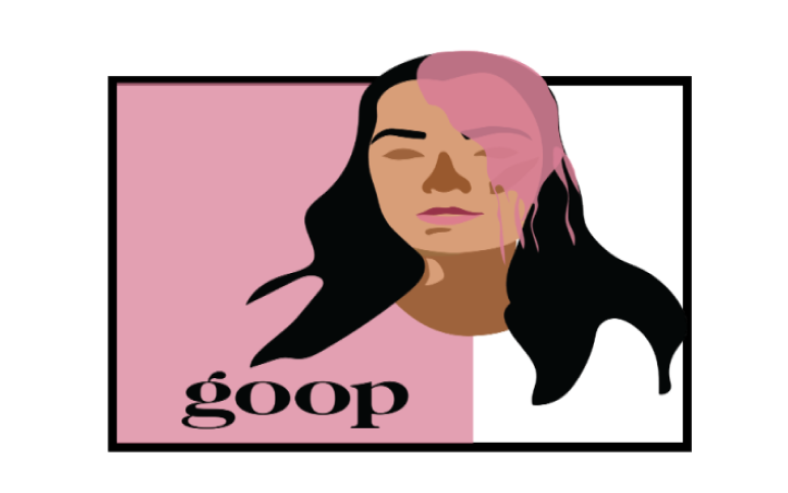It’s hard to log onto Gwyneth Paltrow’s Goop website and not want to make fun of it. For those unfamiliar, Goop is actress Gwyneth Paltrow’s wellness and lifestyle company that began as a weekly newsletter in 2008. Since then, Paltrow has expanded Goop into a $250 million brand. While on the surface, Paltrow’s brand comes off as harmless and their products as silly fun, there are much deeper harmful social and economic implications to the lifestyle Goop claims to support.
A main feature of Goop is its touting of health claims and alternative, new-age health solutions. Although one’s health is very personal and people do and should have the right to choose whether or not they want to seek professional medical help, many of Goop’s articles on these alternative medicines and health solutions are not supported by scientific evidence. While Paltrow says that Goop does not necessarily give advice, Paltrow’s massive following means that what her company posts does in fact have a major influence on its followers. Many who keep up with Goop look up to Paltrow for advice, and we may have the mindset of, “Well, if it’s good enough for Gwyneth Paltrow, then it must be good for me.”
Turning to medical solutions in which the support is anecdotal rather than scientific is dangerous, as health is not something that should be seen as an experiment. Over a year ago, Goop paid $145 000 in penalties after making unsupported claims about three products that it had advertised on its site. Along with that, there are myriad doctors, OB-GYNs, and professors of public health who constantly fact-check Goop—proving that medical experts believe that they need to help prevent the general public from being misled.
…health, wellness, and self-care should not be exclusively reserved for the wealthy.
It is not just Goop’s misinformation on health that is problematic. After all, Goop is much more than a health and wellness blog. It also features articles and products ranging from fashion, to travel, to work life. However, its claim of being a lifestyle brand is flawed because it advertises a lifestyle exclusively geared towards the wealthy. Under the site’s “personal care” section, an article by Goop’s beauty director features a Swiss spa near Lake Geneva, and it advertises a $69 “cellular protection sun cream”—or “sunscreen” for all you poor people out there. And this is exactly where the heart of the issue lies: health, wellness, and self-care should not be exclusively reserved for the wealthy.
While Goop does not explicitly exclude those who cannot afford many of its products, its massive popularity indirectly tells others that in order to reach peak health and take care of oneself, you need to buy these incredibly unaffordable products. An article titled “8 Beauty and Wellness Shortcuts to Save Time (and Effort)” is a perfect example of this phenomenon in practice. Suffering from tired, achy muscles? Just invest in a $600 massager! Stressed out from work? How about buying a $200 meditation machine? While some of the products mentioned in the article are straight-up useless—does anyone really need a chewable caffeine tablet?—it is not just wealthy consumers who would like to find shortcuts to make life easier. In fact, it is those who may have tighter budgets who need easier ways to access self-care. Too bad, though, because if you want to achieve “ultimate wellness,” it can’t be done without spending over $8000 on the “Goop at Sea” cruise through the Italian Riviera.
We need to break down exorbitant barriers deciding who can access self-care and wellness, and we need to work to make wellness more accessible to the general public.
Everyone deserves to feel good about themselves, not just those with hefty wallets. Even if one did have the income to spend on these overpriced products, one does not need to pay an exorbitant amount to be content. Unfortunately, it seems to Goop that in order to live the quality of life of an A-lister and to feel your best, it is necessary to have great wealth. We need to break down exorbitant barriers deciding who can access self-care and wellness, and we need to work to make wellness more accessible to the general public. With a platform this large, Paltrow ought to make wellness more affordable for everyone.








